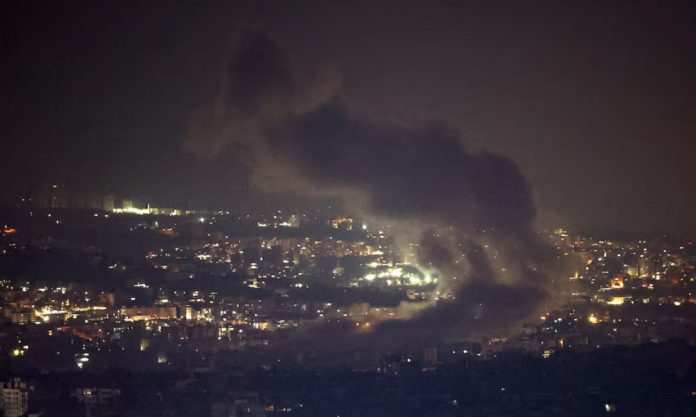Iran and its regional allies will not back down in the face of Israeli airstrikes on Beirut, according to Iranian leader Ayatollah Ali Khamenei.
The Israeli military on Friday targeted the headquarters of Hezbollah’s intelligence agency in Beirut, weighing options for its response to Tuesday’s Iranian ballistic missile attack, which Iran carried out in retaliation for Israel’s military action in Lebanon.
So far, the fate of Hashem Safieddine remains unclear, and neither Israel nor Hezbollah has made any comment.
On Saturday morning, a blast and smoke was visible over Beirut’s southern suburbs, after which the Israeli military announced warnings to residents to evacuate immediately. The alerts further followed in the neighbourhoods of Burj al-Barajneh, Choueifat and Haret Hreik as well as Burj al-Barajneh.
Iranian leader Ayatollah Ali Khamenei told a huge crowd in Tehran Iran and its regional allies will not back down amid Israel sending ground troops into Lebanon this week after Iranian missile attacks. He stressed that Israel’s adversaries in the region should “double your efforts and capabilities … and resist the aggressive enemy.” He said Iran would not “procrastinate nor act hastily to carry out its duty” in confronting Israel.
According to Israel, some 70 rockets were fired from Lebanon into Israel on Friday night, which were either intercepted or fell in open terrain. The Israeli military says the ground operations are localised in villages near the border, but did not specify how far into Lebanon they would go or how long they would last.
Hezbollah also reported Saturday morning that the Israeli army was trying to infiltrate the Lebanese town of Odaisseh in the south of the country and that clashes were continuing. More than 2,000 people have lost their lives in the region over the past year, most of them in the past two weeks. The Lebanese government has accused Israel of targeting civilians, pointing to dozens of women and children killed, but making no distinction between civilians and Hezbollah fighters.
Israel, for its part, says Hezbollah and Hamas are hiding among civilians, adding that it is targeting military capabilities and taking measures to reduce the risk of harm to civilians. However, in contrast, a US citizen was killed in Lebanon this week and Washington is working to determine the circumstances surrounding the incident. State Department spokesman Matthew Miller said the department was “alarmed” by the reports, and added:
It is a moral and strategic imperative that Israel take all feasible precautions to mitigate civilian harm.
Israel says the operation seeks to enable tens of thousands of citizens to return home after Hezbollah bombings forced them to evacuate the north of the country. The conflict between Lebanon and Israel escalated after an attack by Palestinian Hamas militants on 7 October 2023, which Israeli calculations say killed 1,200 people and took about 250 hostages.
Health ministry in Gaza stated that Israel’s subsequent attack on Gaza had killed more than 41,000 Palestinians, displaced almost the entire population of Gaza, caused famine and led to allegations of genocide, which Israel denied.
Recent exchanges of strikes and the Israeli operation near the border caused oil prices to rise, particularly because of the possibility of an attack on Iranian oil facilities, as Israel pursues its goals of dislodging Hezbollah militants in Lebanon and eliminating their Hamas allies in the Gaza Strip.
